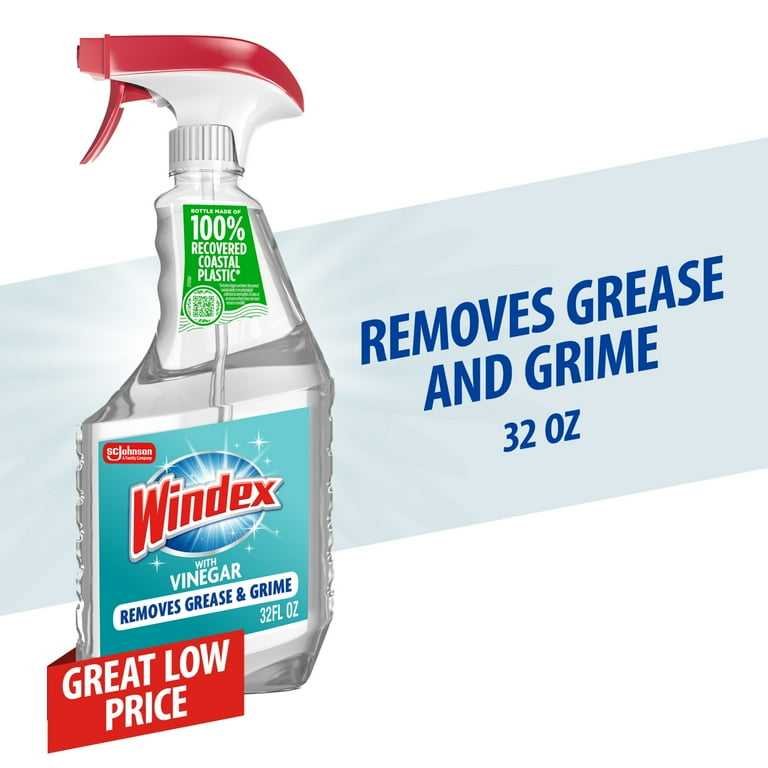Windex generally provides a faster and streak-free shine, making it the go-to choice for many when cleaning windows. However, vinegar is a natural, eco-friendly alternative that’s gentle yet effective.
In short, Windex offers a quick, convenient solution perfect for streak-free results, while vinegar is a cost-effective, environmentally friendly option that works well if you prefer natural cleaning. Your choice depends on whether you prioritize speed and convenience or eco-consciousness and budget.
If you’re trying to decide between Windex and vinegar for cleaning your windows, it all boils down to your priorities. Windex is formulated specifically for glass and provides an easy, rapid clean that leaves those windows crystal clear, making it ideal for busy households or when you need quick results. On the other hand, vinegar is a natural, chemical-free cleaner that’s gentle on the environment and your skin. It may require a little more effort or patience, but it’s a great option for those seeking a budget-friendly, eco-minded way to keep their windows spotless. So, whether you choose the quick spritz of Windex or the natural touch of vinegar, both have their merits—your choice hinges on your cleaning style and values.
Is Windex or vinegar better for windows?
Understanding the Basic Differences Between Windex and Vinegar
Windex is a commercial glass cleaner that contains a mix of chemicals designed to make glass sparkle. It often includes ammonia, which helps break down dirt and grime quickly. Vinegar, on the other hand, is a natural solution made from acetic acid and water, with no added chemicals.
These fundamental differences mean each option works differently on your windows. Windex is engineered for fast results with minimal effort, while vinegar offers a more natural approach that emphasizes safety and eco-friendliness.
How Windex Works on Windows
Windex’s ammonia content effectively cuts through dirt, grease, and fingerprints. Its formulation creates a streak-free shine that many homeowners and professionals prefer. The alcohol and other solvents in Windex evaporate quickly, leaving no residue.
However, Windex is not without drawbacks. Its chemical makeup can sometimes leave streaks if not applied correctly. Additionally, frequent use of commercial cleaners may contribute to indoor air quality concerns due to chemical fumes.
How Vinegar Performs as a Window Cleaner
Vinegar’s acidic nature helps break down mineral deposits, soap scum, and some types of grime. It is especially useful for removing hard water stains or mineral buildup on glass surfaces. Vinegar also has antimicrobial properties and is environmentally friendly.
While vinegar is effective for regular cleaning, it may not be as powerful against greasy or oily stains. Some users report that vinegar can leave a slight residue or odor, but these issues are easily managed with proper rinsing.
Cleaning Effectiveness: Windex vs Vinegar
The choice between Windex and vinegar depends largely on the type of dirt and the desired cleanliness level. Windex excels at removing fingerprints, smudges, and greasy films quickly and with minimal effort. It is designed for convenience and professional results.
Vinegar, however, is more suited for routine cleaning of windows and glass surfaces. It effectively removes light dirt and mineral deposits but might need multiple applications for stubborn grime. For best results, some recommend combining vinegar with water or using it in a spray bottle for easier application.
Cost and Environmental Impact
Cost is an important factor for many homeowners. Windex tends to be more expensive per bottle compared to vinegar, which is affordable and readily available in most grocery stores. Additionally, vinegar is biodegradable and free from harsh chemicals, making it a more eco-friendly option.
In terms of environmental impact, vinegar wins for its simplicity and natural ingredients. It does not contribute to indoor air pollution and is less hazardous to pets and children when used properly.
Safety Considerations and Health Effects
Chemical-based cleaners like Windex may cause skin or eye irritation if not handled carefully. Prolonged inhalation of fumes can also pose health risks, especially in poorly ventilated spaces.
Vinegar’s natural acidity makes it safe for most users, but it can still cause irritation if it comes in contact with eyes. It’s important to rinse thoroughly and use gloves if you have sensitive skin.
Application Tips for Best Results
For Windex:
- Spray evenly across the glass surface
- Use a microfiber cloth or paper towels for wiping
- Buff the glass in circular motions to prevent streaks
For Vinegar:
- Mix equal parts vinegar and water in a spray bottle
- Spray liberally onto the window surface
- Wipe with a clean cloth or squeegee for a streak-free finish
Adding a few drops of dish soap to vinegar can enhance cleaning power for greasy stains. Always clean windows on a cloudy day or when the glass isn’t in direct sunlight to prevent quick evaporation and streaking.
Potential Drawbacks of Each Cleaner
While Windex provides quick, shiny results, its chemical ingredients may pose health or environmental concerns over time. Some users also report streaking or residue if not applied properly.
Vinegar’s natural qualities come with limitations. It may require more effort or additional cleaning agents for stubborn or oily stains. Its smell can linger temporarily but can be mitigated with lemon juice or essential oils.
Related Topics: Other Effective Window Cleaning Methods
Besides Windex and vinegar, there are various ways to keep your windows clean:
- Using a mixture of rubbing alcohol and water for a streak-free finish
- Employing specialized glass cleaning tools like squeegees and microfiber cloths
- Applying natural cleaning solutions such as lemon juice or baking soda for specific stains
Each method has advantages depending on the cleaning task and your priorities.
Final Considerations for Choosing Between Windex and Vinegar
The best choice depends on your cleaning goals, budget, and preferences. If you want a quick, professional-looking shine with minimal effort, Windex is often favored. Conversely, if you prefer an eco-friendly, cost-effective alternative, vinegar offers a reliable option.
It’s also worth considering your windows’ specific needs, such as mineral deposits or stubborn grime. Combining both methods—using vinegar for routine cleaning and Windex for tougher stains—can provide versatile results.
Summary
Choosing between Windex and vinegar for window cleaning hinges on factors like cleaning power, environmental impact, safety, and cost. Windex offers quick, streak-free results but involves chemicals, while vinegar provides a natural, budget-friendly solution with proven effectiveness. The decision comes down to personal preferences and specific cleaning requirements.
Ultimately, understanding the strengths and limitations of each can help you maintain clear, sparkling windows effectively. Regular cleaning with the right product will keep your windows looking their best all year round.
Is Windex Vinegar The Best Window Cleaner?
Frequently Asked Questions
Are there any safety concerns when using Windex versus vinegar on windows?
Windex contains chemicals that can cause eye and skin irritation if not used properly, and the fumes may be harmful if inhaled in large quantities. Vinegar is a natural and non-toxic alternative, making it safer for households with children and pets. However, vinegar’s strong smell might be unpleasant for some people. Always follow safety guidelines and use gloves when handling cleaning products.
How does the cleaning effectiveness of Windex compare to that of vinegar on stubborn stains?
Windex is formulated to quickly cut through grease, grime, and stubborn stains on glass surfaces, providing a streak-free shine. Vinegar, on the other hand, works well for general cleaning and can remove some mineral deposits and light stains, but it may not be as effective on tough, greasy marks. For difficult stains, Windex tends to deliver faster and more reliable results.
Can vinegar be used as a long-term substitute for Windex on windows?
Vinegar can serve as an effective, eco-friendly alternative for regular window cleaning. It is especially good for maintaining a streak-free look without harsh chemicals. However, for heavily soiled windows or areas with sticky residues, Windex might be more effective. Regular use of vinegar can help reduce chemical exposure while keeping your windows clear.
Does Windex leave any residues that vinegar doesn’t?
Windex is designed to evaporate quickly and leave minimal residue, giving a shiny, streak-free finish. Vinegar also leaves no harmful residues and is often praised for its natural cleaning properties. However, Windex contains additives that, if not wiped properly, could leave slight streaks or residues on some surfaces. Proper wiping can minimize any leftover marks from either product.
Which option is more environmentally friendly for window cleaning: Windex or vinegar?
Vinegar ranks higher in terms of environmental friendliness because it is a biodegradable, natural substance without synthetic chemicals. Windex, while effective, contains chemical compounds that may impact the environment if used in large quantities or disposed of improperly. For eco-conscious cleaning, vinegar presents a safer and more sustainable choice.
Final Thoughts
Windex offers a convenient, streak-free shine with added commercial cleaning agents that effectively remove dirt and grime. It provides quick results, especially for those who want a spotless look without much effort.
Vinegar, on the other hand, is an eco-friendly and budget-friendly option that naturally cuts through grime and grease. It’s a safe choice for many surfaces and is free from harsh chemicals.
In conclusion, Windex or vinegar better for windows depends on your priorities. Is Windex or vinegar better for windows? For ease and quick results, Windex is a strong option. If you prefer an eco-friendly alternative, vinegar works well.
- How To Fix Laminated Windshield Chip Effectively - October 29, 2025
- How To Repair Laminated Glass Crack Effectively - October 29, 2025
- How To Clean Laminated Glass Properly For Sparkling Results - October 29, 2025



